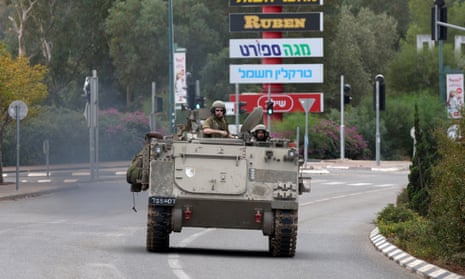Michael Barnett

Israel’s stated war aim is to destroy Hamas and ensure there is no return to the situation before 7 October. This will not be a replay of past wars with Hamas, Israel insists, where it degraded Hamas’s capacities and bought a few years of relative quiet before everything heated up again. Yet this is exactly what is about to happen – but on a much more horrific scale. This outcome can and must be avoided for the sake of the Palestinians and to diminish Israel’s capacity for self-harm in the guise of self-defense. There is an urgent need for a ceasefire.
To see the disaster that lies ahead for Israel and the Palestinians, let’s begin with what we know and consider how the situation may evolve. What would it take for Israel to eradicate Hamas from Gaza? According to most estimates, a bloody, grinding ground war that will last weeks if not months. Whether such an operation would even accomplish this goal is anyone’s guess: Hamas is deeply entrenched in Gaza, has hundreds of miles of tunnels in which to play hide and seek, and could head south and disappear into the refugee camps.
But what if Israel does succeed in wiping out Hamas? Then what? Israel says that it will not reoccupy Gaza. What will emerge from a destroyed Gaza and in the political and security vacuum? Hamas will regroup, or there will be a Hamas 2.0 that might make Hamas 1.0 pale by comparison.
Regardless of whether a ground war succeeds or not, the costs will be enormous and long-lasting. Palestinians will die in the tens of thousands and once again experience trauma beyond belief. Israel will be in a prolonged state of mourning as hundreds, possibly thousands, of its soldiers are buried. Arab states will halt, and maybe reverse, the current normalization process. The longer the campaign goes on, the more likely there will be a wider war, including with Hezbollah and in the West Bank.
The 7 October attack, coupled with any or all of these possible developments, might cause Israel to go even darker and more extreme in its response. Many months ago I used the UN’s early warning indicators to see whether Israel should be put on a watch list for potential atrocity crimes, ethnic cleansing and possibly even genocide. Israel ticked all the boxes and perhaps all that was needed to trigger these crimes against humanity was an act that caused widespread torment and rage in Israel. Even if the unthinkable does not happen, the international community will demand accountability of Israel’s military and political leaders. The UN will hold its inquiry and the international criminal court will possibly issue indictments.
By most cost-benefit calculations, and as painful as it might be for Israel, war is not the answer. But what of the costs of accepting a ceasefire and allowing Hamas to escape punishment for its genocidal attack? Those who support continued bombing and a ground war do so on several grounds. Hamas must be eradicated – but Hamas or something like it will survive. Israel’s deterrence posture must be reinforced – but Israel cannot deter a Hamas that, according to so many, wanted to incite this very reaction by Israel.
The attacks on 7 October occurred because of a failure of defense, not deterrence. Those who died on that day deserve justice. But the deaths of thousands of Palestinians and destruction of their lives is a justice created by retribution and rage. We know from experience that a thirst for justice often only leads to more injustice.
A ceasefire cannot begin until all the hostages are returned. All. Not just those that Hamas no longer needs or that are not Jewish or Israeli. There is no bringing back the dead of 7 October, but the hostages must be brought home. Seeing them as a human shield and as an instrument of war, Hamas might refuse. The international community should use every possible lever to gain their release. A forceful, binding UN security council resolution is a start, but sanctions should also be placed on Iran, a major backer of Hamas, until the hostages are returned.
This current war underscores what we have always known: there are no military solutions to political problems and the political problem is the one-state reality. Israel is now a single state from the river to the sea, nearly evenly divided between Jews and non-Jews.
Israel rules this state with force and apartheid-like measures – Gaza is governed by isolation, deprivation and violence, and the West Bank with a creeping annexation that imposes Jewish supremacy and the denial of basic rights to Palestinians. This supremacy is enforced not only by the “rule of law” but also by violence and terrorism wantonly committed by Jewish settlers, who enjoy the backing of Israel’s government and military. Indeed, settlers have reportedly been taking advantage of the shift in attention from the West Bank to Gaza to intensify their campaign to “cleanse” parts of the West Bank of Palestinians.
Israel has been willing to live with this status quo because, for Israeli extremists, it fulfills their ideological goal of a Greater Israel and, for the rest of Israeli society, because it does not significantly affect their lives. Hamas is a morbid symptom of what this status quo can produce. The West Bank is kept under control by a combination of Israeli occupation, settler violence and a Palestinian Authority whose sole purpose is do Israel’s bidding and enrich itself.
But with no future except for subjugation, how long will Palestinian necks stay in place under boots? Gaza is not separate from the West Bank. Both are part of Israel’s one-state reality. With no political process in place to succeed the current war, it is inevitable that the status quo of injustices piling up will continue.
No comments:
Post a Comment